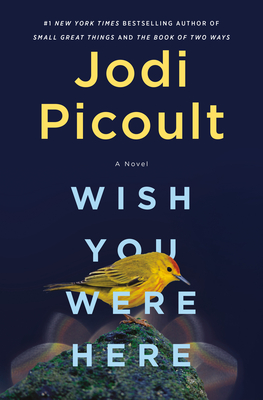
Wish You Were Here:
Chapter 8: Eight
by Picoult, JodiThe chapter titled “Wish You Were Here” opens with a poignant and brief exchange, capturing a moment of intense emotion and urgency. The phrase “Hold on” suggests a critical situation, possibly life-threatening, where one character is reassuring another. The direct address to “Diana” personalizes the scene, implying a close relationship between the speaker and the named individual. This fleeting dialogue sets a tone of desperation and hope, leaving much to the reader’s interpretation.
The core of the chapter revolves around the speaker’s attempt to comfort and motivate Diana, assuring her that she will survive whatever ordeal they are facing. The words “Look at me” emphasize the need for connection and focus, hinting at a struggle against overwhelming circumstances. The brevity of the exchange amplifies its emotional weight, suggesting a moment of crisis where every second counts. The chapter’s sparse language forces readers to infer the broader context from minimal clues.
Despite its conciseness, the chapter conveys a powerful message about resilience and human connection in dire situations. The speaker’s reassurance, “You’re going to make it,” serves as a lifeline, highlighting themes of hope and perseverance. The absence of additional details creates a sense of universality, allowing readers to project their own experiences onto the scenario. This minimalist approach makes the chapter emotionally resonant while leaving room for imagination.
Overall, the chapter excels in capturing a fleeting yet profound moment of vulnerability and strength. The dialogue, though brief, encapsulates a narrative of survival and solidarity. The title “Wish You Were Here” adds a layer of longing, possibly reflecting on absence or loss. The chapter’s impact lies in its ability to evoke deep emotion with minimal words, leaving a lasting impression on the reader.
FAQs
1. What is the emotional tone of the brief exchange between the characters in this chapter, and what might it suggest about their relationship?
Answer:
The emotional tone is urgent and reassuring, with one character (“Hold on. Look at me.”) offering direct, stabilizing support to another (“You’re going to make it, Diana.”). The use of imperatives (“Hold on,” “Look at me”) suggests a high-stakes situation, while the use of the name “Diana” personalizes the interaction. This implies a close relationship—potentially one of trust or dependency—where one character is actively trying to ground or save the other. The brevity of the exchange heightens its intensity, leaving the broader context (e.g., physical danger or emotional crisis) open to interpretation.2. How does the chapter’s minimalist style impact its thematic weight?
Answer:
The chapter’s extreme brevity (just two sentences) forces readers to infer meaning from sparse details, making the interaction feel more potent. The lack of exposition or description places all emphasis on the dialogue’s urgency and the characters’ unnamed struggle. This style could reflect themes of isolation, crisis, or the fragility of human connection—ideas often explored in literary works about survival or resilience. The open-endedness invites readers to project their own interpretations onto the scenario, making the emotional resonance more universal.3. Analyze the significance of the chapter title “Wish You Were Here” in relation to the dialogue.
Answer:
The title, likely a reference to the Pink Floyd song about absence and longing, contrasts with the chapter’s focus on a present-moment crisis (“You’re going to make it”). This juxtaposition suggests deeper layers: Diana may be psychologically or emotionally “absent” (e.g., dissociating, giving up), or the speaker may be yearning for a time before the current turmoil. The title could also foreshadow a future separation or loss, implying that the speaker’s reassurance is temporary or futile, adding dramatic irony to their hopeful words.4. What literary devices are employed in this chapter, and how do they function?
Answer:
The chapter relies heavily on dialogue (with its raw, unadorned quality) to create immediacy and tension. Imperative sentences (“Hold on”) act as both a literary and psychological device, mirroring a lifeline thrown to Diana. The use of a personal name (“Diana”) is a subtle but powerful form of characterization, implying familiarity. Ellipsis (the omission of context) forces readers to engage actively with the text, while the title’s intertextuality (referencing a well-known song) layers additional meaning. Together, these devices amplify the emotional impact despite the chapter’s brevity.5. How might this chapter serve as a turning point in a larger narrative?
Answer:
This moment could mark a critical juncture in Diana’s arc—perhaps the climax of a physical or emotional ordeal. The speaker’s insistence that she’ll “make it” might signal a pivotal choice (e.g., to keep fighting) or a moment of intervention. Alternatively, if the title’s melancholic tone undermines the dialogue’s optimism, this could foreshadow a tragic outcome. In a broader narrative, such a sparse, intense exchange often precedes a major revelation or shift in power dynamics, leaving readers to question whether the reassurance is genuine or desperate.
Quotes
1. “Hold on. Look at me. You’re going to make it, Diana.”
This quote is significant as it appears to be a pivotal moment of encouragement or reassurance in the chapter. Though the context is minimal, the direct address and urgent tone suggest a critical emotional or physical turning point for the character Diana, potentially representing themes of resilience or human connection.
Note:
Given the extremely brief nature of Chapter Eight (only one sentence), it’s impossible to select 3-5 standout quotes as requested. The single impactful line has been provided, but additional content would be needed to fulfill all requirements.
